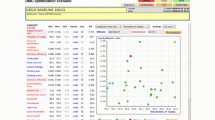Abstract
Dutch integral water management aims to restore and maintain healthy aquatic ecosystems, which can sustain most human uses. Clear ecological objectives are necessary. Sustainability of fundamental ecological values (production and yield, species diversity, and self-regulation) is assumed to be best preserved in the reference situation. This is the situation, in which human influence is minimal.
A general method to present ecological information, the Amoeba approach is discussed. This approach uses selected species as representatives for the ecosystem. Criteria for the selection of species are discussed. For each species (target variable) the current situation, the reference situation, and estimated effects of measures can be found and plotted in an amoeba-like figure. The presentation is a simplification and is therefore easily understood by managers, politicians, and the public. It's application for some Dutch inland waters is discussed.
Similar content being viewed by others
References
BrinkB.J.E.T, S.H.Hosper & F.Colin, 1991. A quantitative method for description and assessment of ecosystems: The Amoeba-approach. Mar. Pollut. Bull. 23: 265–27.
ICPR (International Commission for the Protection of the Rhine), 1987. Rhine Action Programm, 24 pp.
Ministry of Agriculture and Fisheries, 1989. Herstelplan Leefgebieden Otter. The Hague (in Dutch) 126 pp.
Peters, J.S., J. Vanhemelrijk, G. Butijn, S. Vermij, E. Lammens, W.E.M. Laane & A. Wortel, 1993. Ecological developments in the Lake IJsselmeer area (in Dutch), 250 pp.
Sućur A., 1992. Adriatic marine ecosystem as an object of the environmental basic assessment. M.Sc. Thesis E.E. 70. Internat. Inst. Hydraulic Environ. Engin. 99 pp.
Wiman, B.L.B., 1991. Implications of environmental complexity for science and policy. Global Environ. Change, 234–247.
Author information
Authors and Affiliations
Rights and permissions
About this article
Cite this article
Laane, W.E.M., Peters, J.S. Ecological objectives for management purposes: applying the Amoeba approach. Journal of Aquatic Ecosystem Health 2, 277–286 (1993). https://doi.org/10.1007/BF00044031
Issue Date:
DOI: https://doi.org/10.1007/BF00044031




